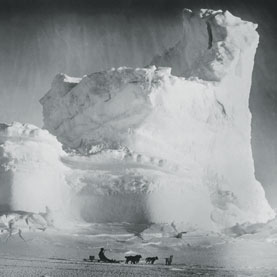Greater Glory: Why Scott Let Amundsen Win the Race to the South Pole
In the race to the South Pole, explorer Robert F. Scott refused to sacrifice his ambitious science agenda
By Edward J. Larson | Friday, May 27, 2011 | 2
Permanent Address: http://www.scientificamerican.com/article.cfm?id=greater-glory

SIDE TRIP: One of Scott’s 32 expedition members sleds past a massive ice structure named Castle Berg, off the shore of Ross Island, Antarctica. Image: Corbis
The history books say that Roald Amundsen beat Robert F. Scott in a race to the South Pole in 1911. Less widely known is that Scott had big scientific ambitions for his trip, which he largely fulfilled.
Scott’s team made several side trips to search for fossils and other scientific evidence, despite competition from Amundsen.
One of Scott’s most significant finds was fossils of an ancient plant, Glossopteris, that proved to be important evidence in support of Darwin’s theory of evolution.
One hundred years ago, in June 1911, Robert Falcon Scott and 32 explorers—most of them British scientists, naval officers or seafarers—were huddled in the darkness of the Antarctic winter, when the sun never rises above the horizon and up to eight feet of ice seals the surrounding sea. Winter temperatures on Ross Island, the southernmost piece of exposed land reached by Scott’s ship, can plunge below –50 degrees Fahrenheit. Blizzards rise up often. Lacking wireless communication and totally cut off from the outside world, the explorers waited for the longer, warmer days of spring, in October, when some of them would set out to cross nearly 900 miles of ice shelf, mountains and the Polar Plateau to arrive at a spot of no particular interest to anybody except for its location at the bottom of the earth.
Two British expeditions had tried to reach the South Pole before. Scott led one himself from 1901 to 1904, and Ernest Shackleton led another from 1907 to 1909. They had fallen short. This time, though, Scott was brimming with confidence. Drawing on those earlier experiences, he had methodically planned this expedition not merely to be the first to reach the South Pole but also to advance an ambitious scientific agenda. He had already put in place several teams that would fan out across the Ross Sea basin, collecting fossils, data and other things of scientific…